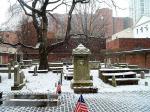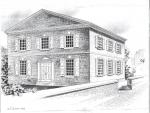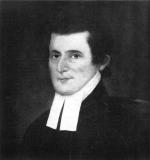![header=[Marker Text] body=[ In 1782 this congregation built Philadelphia's first synagogue at this site. Established about 1740, it had first worshipped in rented quarters here. The congregation built a larger synagogue, 1824, and has been elsewhere in the city since 1860.] sign](http://explorepahistory.com/kora/files/1/10/1-A-276-139-ExplorePAHistory-a0h8x0-a_450.jpg)
Mouse over for marker text
Name:
Kahal Kadosh Mikveh Israel
Region:
Philadelphia and its Countryside/Lehigh Valley
County:
Philadelphia
Marker Location:
Cherry St. between 3rd and 4th Sts.
Dedication Date:
September 28, 1992
Behind the Marker
Visitors to Philadelphia will note, sandwiched between row houses on Spruce Street between Eighth and Ninth Streets, the oldest surviving Jewish presence in Pennsylvania: a cemetery established in 1740. In 1737, brothers Nathan and Isaac Levy, American-born sons of a well-established New York merchant family, settled in Philadelphia and founded an informal Jewish congregation, which held its religious services in the private homes. The following year, when one of his children died, Nathan purchased a small plot of ground from the Penn family with permission to make it a family cemetery. Levy then purchased the present lot on Spruce Street above Eighth. This became the cemetery for Philadelphia's early Jewish community. Here Haym Salomon and other leading Jews were buried until space ran out.
In the 1700s, William Penn's new world colony had offered religious toleration to many of the religiously persecuted peoples of Europe. But only those who were Protestant and professed a belief in Jesus Christ, among other qualifications, could vote or hold political office. Thus, Pennsylvania's early Jewish community enjoyed religious toleration, but not religious freedom, being disenfranchised from the political process.
Adoption of the name "Mikveh (the hope of) Israel" by the congregation did not occur until July 30, 1771 when it rented a small house in Cherry Alley to use as a house of worship. On the eve of the American Revolution, the city had about twenty-five Jewish families, and a total population of between 100 and 200 Jews. Since most of Pennsylvania's Jews settled in Philadelphia and were disproportionately male, some married Christians and assimilated into the Gentile community.
During the Revolution, the British occupation of New York, Charleston, South Carolina, and Savannah, Georgia–American cities with the other main Jewish communities–led patriotic Jewish refugees to congregate in Philadelphia. More than 100 men, most of whom returned to their home towns when the war ended, belonged to an expanded Mikveh Israel, which in 1780 purchased a new lot on the north side of Cherry Street above Third. Here Mikveh Israel built its first synagogue. Dedicated on September 13, 1782, the Mikveh Israel Synagogue served Philadelphia's Jewish community on that same site until 1860 when a new, larger synagogue was built at Seventh and Arch Streets.
Pennsylvania's Constitution of 1776 barred Jews from the political process. The test oath of the 1776 state constitution was inserted at the request of the Rev. Henry Melchior Muhlenberg, a leading German Lutheran minister, whose anti-Semitism set a pattern for that of others who scapegoated the state's handful of Jews as a way of diverting attention from their own patriotic shortcomings.
Rev. Henry Melchior Muhlenberg, a leading German Lutheran minister, whose anti-Semitism set a pattern for that of others who scapegoated the state's handful of Jews as a way of diverting attention from their own patriotic shortcomings.
Despite their disenfranchisement, Philadelphia's Jews demonstrated their loyalty to the patriot cause in several ways. A broker to the Office of Finance superintendent Robert Morris, Haym Salomon negotiated the sale of notes and currencies to meet the needs of the Continental Congress. Isaac Moses, a prosperous merchant, subscribed 3,000 pounds and his personal credit to furnish provisions for the Continental Army. Benjamin Nones served heroically in the War for American Independence, fighting at the Battle of Savannah. Still other patriotic Jews suspected as spies by the Redcoat army were exiled from Philadelphia during the British occupation of the city in 1777-1778.
Haym Salomon negotiated the sale of notes and currencies to meet the needs of the Continental Congress. Isaac Moses, a prosperous merchant, subscribed 3,000 pounds and his personal credit to furnish provisions for the Continental Army. Benjamin Nones served heroically in the War for American Independence, fighting at the Battle of Savannah. Still other patriotic Jews suspected as spies by the Redcoat army were exiled from Philadelphia during the British occupation of the city in 1777-1778.
Jewish support for the Revolution provided Rabbi Gershom Seixas and several members of Mikveh Israel the opportunity to petition the Pennsylvania Council of Censors in 1782, to revise the test oath. They argued that "Jews are as fond of liberty as other religious societies" and that while they did not wish to hold political office, they regarded the oath as a "stigma upon them and their nation and their religion" and as inconsistent with the declaration on the right of conscience contained elsewhere in the constitution. To their dismay, the council of censors did not act on the petition. In 1787, while the Federal Convention met in Philadelphia, Jonas Phillips filed another petition asking that there be no federal religious discrimination against Jews. He was pleased to discover the Convention never even considered any. In 1790, when Pennsylvania adopted a new constitution, Jews, Muslims, and deists who "believed in Divine Providence" were granted legal equality.
In the 1790s, many Pennsylvania Jews were at first ardent Federalists by virtue of their financial and personal connections with members of the national political elite. But when the revolutionary French government granted Jews total equality in 1793 - many states in the United States still barred them voting and holding public office - they almost unanimously began to support France, a government the Federalists increasingly opposed. In response, the Federalist Party tried to disenfranchise them, insisting that only Christians could be "real Americans." John Fenno, editor of the Federalist newspaper Gazette of the United States, suggested that the Jews go "live in the wilderness like their biblical ancestors."
In Pennsylvania, much of this anti-Semitism focused around Israel Israel in Philadelphia and his son John Israel in Pittsburgh. Ironically, neither was a practicing Jew and were respectively only half and one-quarter ethnically Jewish. A founder of Philadelphia's Democratic Society, formed in 1793 to support the French Revolution, the elder Israel was accused of using Jewish guile to manipulate blacks, Germans, and other gullible ethnic groups to turn against the Federalists. John Israel began the first Jeffersonian newspaper in Pennsylvania west of the Alleghenies in 1798, first at Washington, then at Pittsburgh.
With the defeat of the Federalist Party in national and state election of 1800, anti-Semitism ceased to be a viable election issue. Republican Governor Thomas McKean set a precedent for Jewish office holding when he appointed Jewish Revolutionary War hero Benjamin Nones, a particular target of anti-Semitic rhetoric, as a notary public, which gave him the right to approve citizenship applications. In the early 1800s, anti-Semitism almost vanished from the public debate, only to return in the 1830s, when large numbers of German Jews began to come to Pennsylvania and America.
Thomas McKean set a precedent for Jewish office holding when he appointed Jewish Revolutionary War hero Benjamin Nones, a particular target of anti-Semitic rhetoric, as a notary public, which gave him the right to approve citizenship applications. In the early 1800s, anti-Semitism almost vanished from the public debate, only to return in the 1830s, when large numbers of German Jews began to come to Pennsylvania and America.
In the 1700s, William Penn's new world colony had offered religious toleration to many of the religiously persecuted peoples of Europe. But only those who were Protestant and professed a belief in Jesus Christ, among other qualifications, could vote or hold political office. Thus, Pennsylvania's early Jewish community enjoyed religious toleration, but not religious freedom, being disenfranchised from the political process.
Adoption of the name "Mikveh (the hope of) Israel" by the congregation did not occur until July 30, 1771 when it rented a small house in Cherry Alley to use as a house of worship. On the eve of the American Revolution, the city had about twenty-five Jewish families, and a total population of between 100 and 200 Jews. Since most of Pennsylvania's Jews settled in Philadelphia and were disproportionately male, some married Christians and assimilated into the Gentile community.
During the Revolution, the British occupation of New York, Charleston, South Carolina, and Savannah, Georgia–American cities with the other main Jewish communities–led patriotic Jewish refugees to congregate in Philadelphia. More than 100 men, most of whom returned to their home towns when the war ended, belonged to an expanded Mikveh Israel, which in 1780 purchased a new lot on the north side of Cherry Street above Third. Here Mikveh Israel built its first synagogue. Dedicated on September 13, 1782, the Mikveh Israel Synagogue served Philadelphia's Jewish community on that same site until 1860 when a new, larger synagogue was built at Seventh and Arch Streets.
Pennsylvania's Constitution of 1776 barred Jews from the political process. The test oath of the 1776 state constitution was inserted at the request of the
Despite their disenfranchisement, Philadelphia's Jews demonstrated their loyalty to the patriot cause in several ways. A broker to the Office of Finance superintendent Robert Morris,
Jewish support for the Revolution provided Rabbi Gershom Seixas and several members of Mikveh Israel the opportunity to petition the Pennsylvania Council of Censors in 1782, to revise the test oath. They argued that "Jews are as fond of liberty as other religious societies" and that while they did not wish to hold political office, they regarded the oath as a "stigma upon them and their nation and their religion" and as inconsistent with the declaration on the right of conscience contained elsewhere in the constitution. To their dismay, the council of censors did not act on the petition. In 1787, while the Federal Convention met in Philadelphia, Jonas Phillips filed another petition asking that there be no federal religious discrimination against Jews. He was pleased to discover the Convention never even considered any. In 1790, when Pennsylvania adopted a new constitution, Jews, Muslims, and deists who "believed in Divine Providence" were granted legal equality.
In the 1790s, many Pennsylvania Jews were at first ardent Federalists by virtue of their financial and personal connections with members of the national political elite. But when the revolutionary French government granted Jews total equality in 1793 - many states in the United States still barred them voting and holding public office - they almost unanimously began to support France, a government the Federalists increasingly opposed. In response, the Federalist Party tried to disenfranchise them, insisting that only Christians could be "real Americans." John Fenno, editor of the Federalist newspaper Gazette of the United States, suggested that the Jews go "live in the wilderness like their biblical ancestors."
In Pennsylvania, much of this anti-Semitism focused around Israel Israel in Philadelphia and his son John Israel in Pittsburgh. Ironically, neither was a practicing Jew and were respectively only half and one-quarter ethnically Jewish. A founder of Philadelphia's Democratic Society, formed in 1793 to support the French Revolution, the elder Israel was accused of using Jewish guile to manipulate blacks, Germans, and other gullible ethnic groups to turn against the Federalists. John Israel began the first Jeffersonian newspaper in Pennsylvania west of the Alleghenies in 1798, first at Washington, then at Pittsburgh.
With the defeat of the Federalist Party in national and state election of 1800, anti-Semitism ceased to be a viable election issue. Republican Governor
Beyond the Marker







